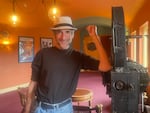
The founder and owner of Portland's Mississippi Records, Eric Isaacson, helped organize the Off the Charts film screening and local song-poem writing contest at the Hollywood Theatre in March 2023.
Jenn Chávez / OPB
Twenty years ago, Eric Isaacson founded Mississippi Records, a record store and label based in North Portland. Since its inception, it’s specialized in sharing music outside of the mainstream.
”We’re mainly interested in things that come from underground cultures, or things that come from very individualistic people, and not things that come from any kind of corporate world of music,” Isaacson said.
The label’s releases have ranged from outsider blues to Ethiopian piano compositions, from 1960s cumbia rock to homegrown punk.
To help ring in its 20th anniversary, Mississippi Records teamed up with Portland’s historic Hollywood Theatre and the local music community to celebrate another musical culture from the underground: the time-honored tradition of song-poems. Through a song-poem writing contest, community members submitted “song lyrics, or poems, or rants” to be interpreted and performed live by Portland musicians, with strange and wonderful results.

Mississippi Records and the Hollywood Theatre teamed up to present the Off the Charts film screening and song-poem writing contest in March 2023.
Jenn Chávez / OPB
What is a song-poem?
The song-poem industry dates back to the early 20th century. Music production companies would put advertisements in magazines or newspapers asking readers to send in their poems, on any topic under the sun, to be set to music by professional musicians for a fee. Then these nonprofessional songwriters would get the music back — first, in sheet music form, and later, on records — with the idea that they could sell the demos to song publishing companies, and just maybe, hit it big.
”The mainstream music industry really looked down on this practice. They used to call it ‘song sharking.’ It was considered a low way to take advantage of rubes, supposedly, and have them send money for nothing,” Isaacson said. “But the thing is, it wasn’t for nothing.”
”People were getting these amazing records produced of their music that they could share with their friends or have as a keepsake. So it was actually like an artistic collaboration between these random people and these studio musicians,” Isaacson said. ”People would write unusual lyrics and send them in, and these slick Nashville professional musicians would set them to music and sometimes make really interesting music out of this combination. Some really great art came out of it.”
Isaacson, who’s been collecting records since he was a young child, said he first came across song-poems by happy accident.
”There’d be these cheesy compilations on various themes, such as Elvis’s death, or America, or Jesus. And I ended up buying a few of these, because they were just unusual looking, and I couldn’t figure out what they were. It was very mysterious,” he said. “Not until a lot later in life did I learn about the whole song-poem industry. And I was fascinated by it.”
Entire companies sprung up that were dedicated to recording this music. One of them is Magic Key Productions, founded by Art Kaufman, best known by his musical moniker, David Fox. “We do many, many different styles of music,” Fox said. “Some companies do just certain styles, but my company, we’ve done it all, from country to rap to hard rock and roll.”
Fox has been making song-poems since 1977.
”I worked for another company before I started my own company, called George Liberace Music. And Elvis died that summer,” he recalled. “Hundreds of song poems came in, because he just died. You know, Elvis the Rock and Roll King, titles like that, Elvis Is With Jesus again. My first assignment I wrote, I think, 10 songs about Elvis. So, when bad news happens, that’s when good news happens for the song-poem business,” Fox said.
It was only fitting that a song-poem veteran like Fox would come to town as a special guest for Portland’s own song-poem celebration in March.

Song-poem musician and Magic Key Productions founder David Fox was a special guest at Mississippi Records and the Hollywood Theatre's Off the Charts film screening and song-poem writing contest event.
Jenn Chávez / OPB
Portland song-poems come to life
The chance to see and hear local collaborative art brought to life resulted in a packed Hollywood Theatre on March 23. Isaacson of Mississippi Records said events like this make him love Portland.
”I’ve been doing Mississippi Records for 20 years, and it seems like the more challenging and the more strange and the more hard to explain an event is, the more people will show up … We’ve gotten away with doing some really out-there art, and this town has supported it,” Isaacson said. “A lot of people talk smack about Portland and like to talk about how it’s a sort of culturally dead city. But, you know, we’re like Paris in the ‘60s. People here have open ears and open hearts and open minds, and I’m really grateful for that.”
![A hand-drawn movie and event poster. “Mississippi Records Music & Film Series 20th Anniversary Presents: OFF THE CHARTS: A Documentary and Song Contest With Live Bands. Song Poems Interpreted By: L.O.X. / Roman Norfleet & Be Present Art Group/ Lily & Lavendar Flu / Cruise Control / The Grand Style Orchestra. YOU CAN PARTICIPATE: Please send song lyrics or poems or rants to [contact info]. If we select your entry, you can win up to $300 and have the bands listed interpret your song live!” Each band has cartoons of animals or weird little creatures playing music next to their names.](https://opb-opb-prod.cdn.arcpublishing.com/resizer/v2/NYUAU7JRRNFT3IFYGHZBVSV4TY.tif?auth=4a8b8b50ccaac72252c15a208ced7d35b50a606c4d3084dce794f798c12773f6&width=150)
A hand-drawn poster by Raf Spielman advertised Mississippi Records' Off the Charts film screening and song-poem writing contest at the Hollywood Theatre in March 2023.
Raf Spielman / Courtesy of Raf Spielman
Mississippi Records used their long-running Music & Film Series at the Hollywood Theatre to bring moviegoers both the documentary “Off the Charts: The Song Poem Story” and the local song poem contest. Song-poems featured in the documentary explored topics including kung-fu bicycles, rug bugs, devotion to television, The Thing, reverence of Jimmy Carter, Annie Oakley as a historical heartthrob, and more. Then, newly created song-poems were brought to life on stage for locals after the credits rolled.
“I thought it would be fun to do a song-poem contest as part of the 20th anniversary of Mississippi Records because as far as fringe music cultures go, this might be one of the most fringe,” Isaacson said. “I thought it would also be a really interesting way to involve the community in the artistic process of making a song, with interesting local bands that I like, and have it be a collaborative experience.”
One hundred thirty entries were submitted to the contest. Of those, Isaacson picked 50 of his favorites, presented them to the local musicians who’d lined up to participate, and let them choose their favorite five to interpret into music to perform live at the Hollywood Theatre.
To set the mood, Portland DIY country rock/power pop band Cruise Control started things off as David Fox’s backing band for a surprise performance of one of his most beloved song-poems. “Nonviolent TaeKwondo Troopers,” from the Off the Charts soundtrack, was written by Caglar Juan Singletary about riding a kung-fu bicycle named Angelaria.
”Some of the fans have made their own videos of it on YouTube,” Fox said. “I’m not sure why it’s popular, but it’s just a fun song, and I’m not even sure what it means!”
Cruise Control followed it up with the first local contest entry, an untitled song-poem written by Kathy Duffy. “Walk upon the baby’s back, and show a place where God once sat,” they sang, with plastic baby dolls in hand (one of which stayed perched on the drum kit for the remainder of the evening).
Art punk band L.O.X. took the stage to interpret another local song-poem, People of Hollywood, written by Bess Merideth. “Dear people of Hollywood! May the damage leave the light on behind you,” it went.
The Grand Style Orchestra was also on the lineup. Band member Shorty Grapes said the massive freeform ensemble group describes itself as “social music.” The song-poem they interpreted was an ode to the sea: “I Like the Ocean,” written by Chris Kerr. It took the second place prize.
”It seems to be a tale of freedom, and interspecies joy, perhaps,” Grapes said. “The music came pretty readily for it. I came up with the tune the day I got the lyrics.”
The orchestra’s trombonist sang the lead vocals: “I like the ocean, I like the sea. High tide forever, low tide ain’t me. Message in a bottle, Kawasaki Ninja full throttle, it’s good to be free!”
Roman Norfleet, of the spiritual jazz ensemble Be Present Art Group, chose to perform the song-poem “Portland Blue Tarp Blues,” a song-poem written by Doug Dvorkin about gentrification in Portland. Norfleet said the authenticity of the lyrics, which won third place in the contest, stood out to him.
“Because it’s real, and the realness of it makes the atmosphere here different because of it, and not in a positive way. There’s a lot of displacement, a lot of communities have been spread out, a lot of disenfranchisement, passive-aggressiveness,” Norfleet said. “I’ve been a lot of places here in the U.S., and Portland’s pretty trippy in that way.”
With a keyboard and saxophone at hand, Norfleet sang: “This town is gentrified, and we’re living between the cracks. This town is gentrified, but we can take it back!”
The winning song-poem of the evening? “Keeper of Souls,” performed by psych band Lavender Flu, and written by Portland’s Iris Martin, age 9.
”When I saw the poster, I wanted to write a song. So the first thing that popped in my head was black cats, because they’re my favorite animal. So I basically wrote one about a cat, like my cat … Coconut,” Martin said.
The song describes the adventures of a black cat with a tiny cane and pink hat that flies over the city, set to psychedelic guitar riffs.
“So let the cat be, and let’s fight for the right, and conquer the wrong. Let’s fight for nature together, to be stronger together. Let the bad people let us be. Kind and courageous, so worthy!”
The announcement that her song-poem took first place — and a trip onstage to claim her prize — was thrilling.
”I was surprised to hear third wasn’t me, or second. And then when I heard my name, I started crying,” Martin said.
They were tears of happiness. A crew of supporters was there to congratulate her, including her teacher from school. What did her teacher have to say?
”Well, that it was amazing and stuff! And we probably have the same taste, because we’re both triple Libras,” Martin said.

Iris Martin, 9, won Mississippi Records' Off the Charts song-poem writing contest in March 2023 with her song lyrics, "Keeper of Souls."
Jenn Chávez / OPB
